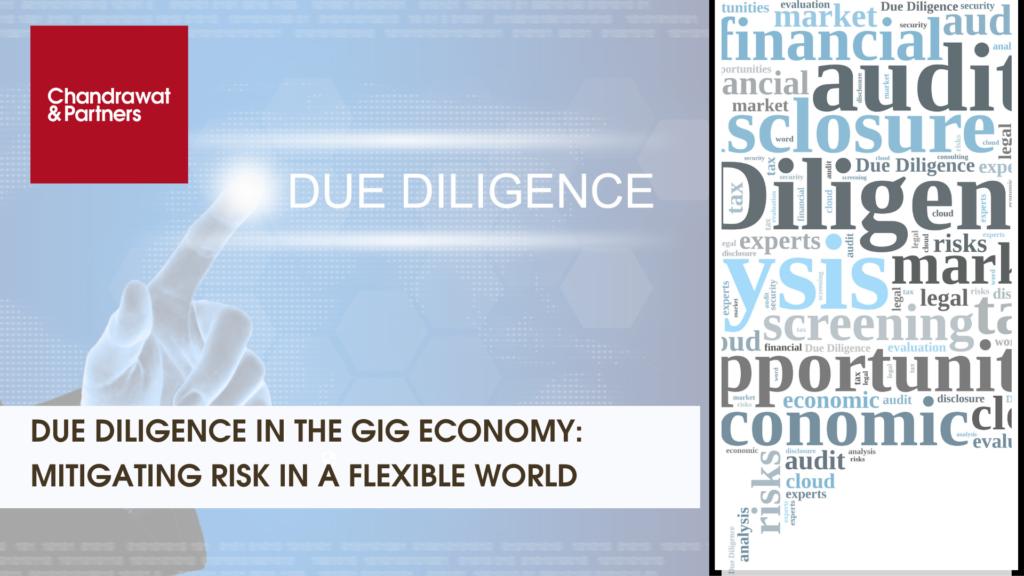
DUE DILIGENCE IN THE GIG ECONOMY: MITIGATING RISK IN A FLEXIBLE WORLD
INTRODUCTION
The rise of freelancing platforms and the gig economy has fundamentally changed the way we work. Businesses can now access a global talent pool of independent contractors and freelancers, offering greater flexibility and cost-effectiveness. However, this shift also presents new challenges, particularly when it comes to assessing the qualifications and trustworthiness of independent workers.
This is where due diligence comes in. Traditionally associated with mergers and acquisitions, due diligence is the process of investigating a potential business partner to identify and mitigate risks. In the gig economy context, due diligence involves evaluating freelancers and contractors before engaging them for a project.
WHY DUE DILIGENCE MATTERS IN THE GIG ECONOMY
While platforms offer basic screening mechanisms, the onus of thorough evaluation often falls on the businesses themselves. Here’s why due diligence is crucial:
- Skills and Expertise:Freelancer profiles can be misleading. A robust due diligence process ensures one can hire individuals with the right skills and experience for the job.
- Quality of Work:Past projects and client testimonials can provide valuable insights into a freelancer’s work ethic and ability to deliver high-quality results.
- Reliability and Time Management:Meeting deadlines is critical. Due diligence helps assess a freelancer’s track record of completing projects on time and within budget.
- Compliance and Legalities:Depending on one’s location and project specifics, independent contractors may have specific legal and tax implications. Due diligence helps ensure compliance.
- Data Security and Confidentiality: If one’s project involves sensitive information, it’s vital to verify a freelancer’s data security practices and adherence to confidentiality agreements.
ADAPTING DUE DILIGENCE FOR THE GIG ECONOMY
Traditional due diligence processes may not translate perfectly to the fast-paced, project-based nature of gig work. Here’s how to adapt one can approach:
Prioritize Skills Assessments: Don’t just rely on self-reported skills. Consider including relevant skills tests, portfolio reviews, and even references from past clients to get a more complete picture of a freelancer’s capabilities.
Leverage Online Tools: Many freelancing platforms offer features like project history, client reviews, and verified skills badges. Utilize these resources alongside one’s own due diligence efforts to gain a well-rounded understanding of a freelancer’s qualifications.
Focus on Communication: Clear communication is paramount in the gig economy. During the initial contact, assess a freelancer’s responsiveness, professionalism, and ability to grasp project requirements. This can help one gauge whether they will be a good fit for one team and working style.
Standardize a Due Diligence Process: Develop a clear, repeatable process for evaluating freelancers. This ensures consistency and reduces the risk of overlooking crucial aspects during the selection process.
BEYOND THE BASICS: BUILDING A STRONG RELATIONSHIP
The success of any working relationship hinges on clear communication and expectations. When engaging a freelancer, take the time to clearly communicate one’s project requirements from the outset. This includes outlining the specific deliverables, deadlines, and one can preferred communication channels.
Investing in a brief onboarding process, even for short-term projects, can yield significant benefits. An onboarding process can help freelancers understand companies’ culture, work style, and any internal tools or resources they may need access to. This can streamline the project workflow and ensure the freelancer is set up for success. As the project progresses, maintaining open communication is crucial. Regular check-ins help to identify and address any roadblocks or questions early on. This fosters trust and allows for course correction if needed.
CONCLUSION
The gig economy offers a wealth of talent and flexibility. By implementing a thorough yet adaptable due diligence process, businesses can mitigate risks, build strong relationships with independent workers, and ultimately, achieve project success in this dynamic new work environment. Remember, due diligence is an ongoing process. As one build trust with a freelancer, the intensity of one’s assessments may adapt, but the core principles of evaluating skills, qualifications, and communication remain essential.
HOW WE CAN HELP
- Our team of legal experts possesses in-depth knowledge of international laws and regulations governing due diligence processes across various industries and jurisdictions. We can provide valuable insights into the legal frameworks that clients need to navigate when conducting due diligence on a global scale.
- We understand that each client and each due diligence process is unique. We work closely with our clients to develop tailored due diligence strategies that address their specific needs, considering factors such as industry standards, regulatory requirements, and risk tolerance.
- Our firm excels in identifying potential risks and vulnerabilities during the due diligence process. We conduct thorough risk assessments and offer practical advice on mitigating risks to protect our client’s interests and investments in the global market.
By providing this spectrum of services, our team equip the clients with the knowledge needed to make well-informed decisions in acquisitions and other business endeavors.
For more information or queries, please email us at
[email protected]
Key Contact

Surendra Singh Chandrawat
Managing Partner

